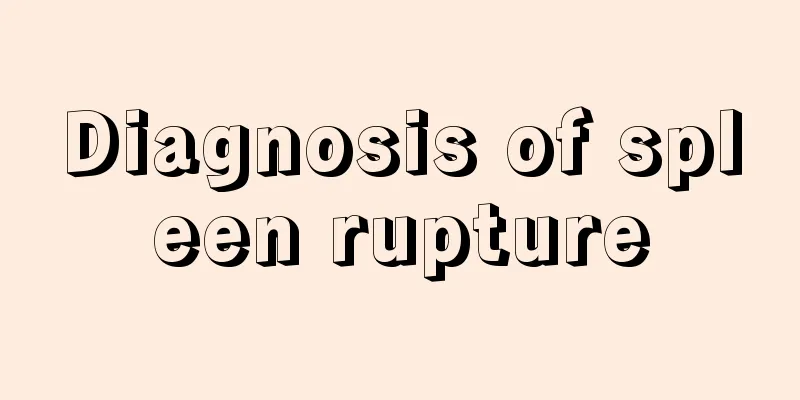Diagnosis of spleen rupture

|
There are several important parts in the human body, and the internal organs are the most important. The spleen is an important organ in the human body. If there is a disease in the spleen, it will affect the body's digestion and absorption function. Therefore, people should pay attention to protecting their spleen, because diseases of the spleen can also affect the occurrence of diseases in other organs. Splenic rupture should be relatively rare, but how is spleen rupture diagnosed? The diagnosis of traumatic splenic rupture mainly depends on ① the history of injury; ② the clinical manifestations of internal bleeding; ③ the absence of coagulated blood during diagnostic abdominal puncture, etc. In cases of splenic subcapsular laceration with subcapsular hematoma, the clinical manifestations are atypical, abdominal puncture is negative, and the diagnosis is difficult to determine at the moment. In recent years, for cases where diagnosis is indeed difficult but the injury condition permits, peritoneal lavage, B-ultrasound, radionuclide scanning, CT or selective abdominal angiography are used to help clarify the diagnosis. (1) Peritoneal lavage is an invasive examination that cannot specifically locate the damaged organ or explain the extent of the damage. There are also a few false positive or false negative results. The analysis must be combined with clinical and other examination results. (ii) B-mode ultrasound is a non-invasive examination that is more commonly used and can show a shattered spleen, a large subcapsular hematoma of the spleen, and blood accumulation in the peritoneal cavity. (III) CT examination can clearly show the morphology of the spleen and has a high accuracy in diagnosing splenic parenchymal laceration or subcapsular hematoma. (iv) Radionuclide scanning can be used to diagnose spleen injury using techniques such as 99m technetium colloidal sulfur scanning or gamma photography, and the method is safe. (V) Selective abdominal artery angiography: This is an invasive examination that is complicated to operate and has certain risks. However, the accuracy of diagnosing splenic rupture is quite high and can show the location of damaged arteries and parenchyma in the spleen. It is only used for closed injuries that are stable and cannot be clearly diagnosed by other methods. It should be emphasized that spleen rupture is often accompanied by damage to other organs, such as liver, kidney, pancreas, stomach, intestine, etc., which should not be missed during diagnosis and treatment. This is an introduction to the question of how to diagnose spleen rupture. Any disease requires a good diagnosis, and we cannot simply conclude that we have a certain disease based on our own judgment. So the diagnosis of disease is very important in our lives. Only if we all believe in our own abilities can we live a better and healthier life. Any article will be helpful to us. |
<<: Cold hands and feet with cold sweat
Recommend
Lemon for dandruff removal
Lemon is a fruit that many people like to eat. Le...
What are the symptoms of temporomandibular joint disorder
Temporomandibular joint disease is a common disea...
Clear mucus in stool
The excess waste produced by the human body every...
Early detection of early symptoms of kidney cancer can help treatment
Kidney cancer is a disease with a high incidence ...
What are the symptoms of sagging eyelids in middle-aged women
Ptosis is the drooping of the upper eyelid, which...
Insight! The truth and falsehood of nine classic old sayings
When we advise others, we often say, "If you...
How to cook without oil
As we all know, cooking requires the use of oil. ...
How to take care of your hair after it softens? Pay attention to these 5 points
After softening the hair, it will become very sen...
How long does it take for nerves to recover
There are many neurological diseases, which are o...
What will happen if bladder cancer recurs and is not treated
Bladder cancer refers to a variety of malignant t...
Can patients with nasopharyngeal cancer eat oil residue?
It is recommended that patients with nasopharynge...
How to treat advanced liver cancer
How to treat advanced liver cancer? Liver cancer ...
Seafood clay pot rice recipe
There are many varieties of clay pot rice, and se...
What are the clinical symptoms of kidney cancer?
Kidney cancer is a common type of malignant tumor...
Does Wujiang fish have many bones?
Wujiang fish is a very popular fish and a very im...









